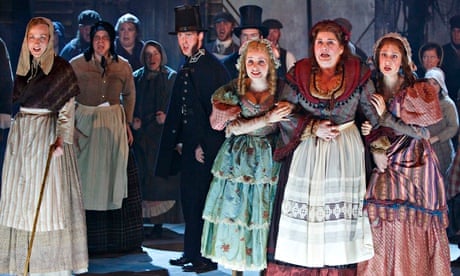In his many successful translations of opera librettos for English National Opera, most recently in Cosi Fan Tutte, Jeremy Sams has never been afraid to embellish the original texts. Now, directing Britten's Peter Grimes at the opening of the Grange Park season, he boldly adds a dramatic device that does the same thing, but one Britten surely would have loathed.
A repeated dramatic flashback, developed in detail through each of the four sea interludes, shows Grimes as a young apprentice abused by his own brutal master and then bullied by the children of the Borough, while a young Ellen Orford looks on haplessly. It is a powerful idea powerfully executed, and it instantly provides a deeper explanation of why the adult Grimes is so damaged and the Borough of the opera so hostile. Yet Britten never offered such an explanation, and handing it to the audience on a plate reduces the inner tensions that the music takes such trouble to establish.
It also makes Grimes himself a less enigmatic figure, a rendering reinforced by Carl Tanner's vocally powerful but unremittingly fierce characterisation. Tanner was announced as suffering from sinusitis, which may have added to his difficulty in Grimes's more reflective moments, but his relationship with Georgia Jarman's silvery-voiced Ellen, on whom the moral spotlight of Sams's production focuses at the end, seems more than usually hopeless.
The in-your-face naturalistic production is nevertheless a genuine achievement, visually powerful, cramming a riot of characterisation into a small-town pressure cooker, with the sea an omnipresent backdrop. The secondary roles are extremely strong, starting with Clive Bayley's Swallow, whose clarity of diction the rest of the cast would do well to emulate. Stephen Gadd is a sympathetic Balstrode, Gary Griffiths shines as a cheery Ned Keene, while Rebecca de Pont Davies is an on-the-edge Mrs Sedley. Soraya Mafi and Rosie Bell are particularly good as the nieces and Nigel Robson does a fine turn as the minister. Choral standards are decent, but Stephen Barlow in the pit does not shape the score enough, which is shorn of much of its subtlety.

Comments (…)
Sign in or create your Guardian account to join the discussion